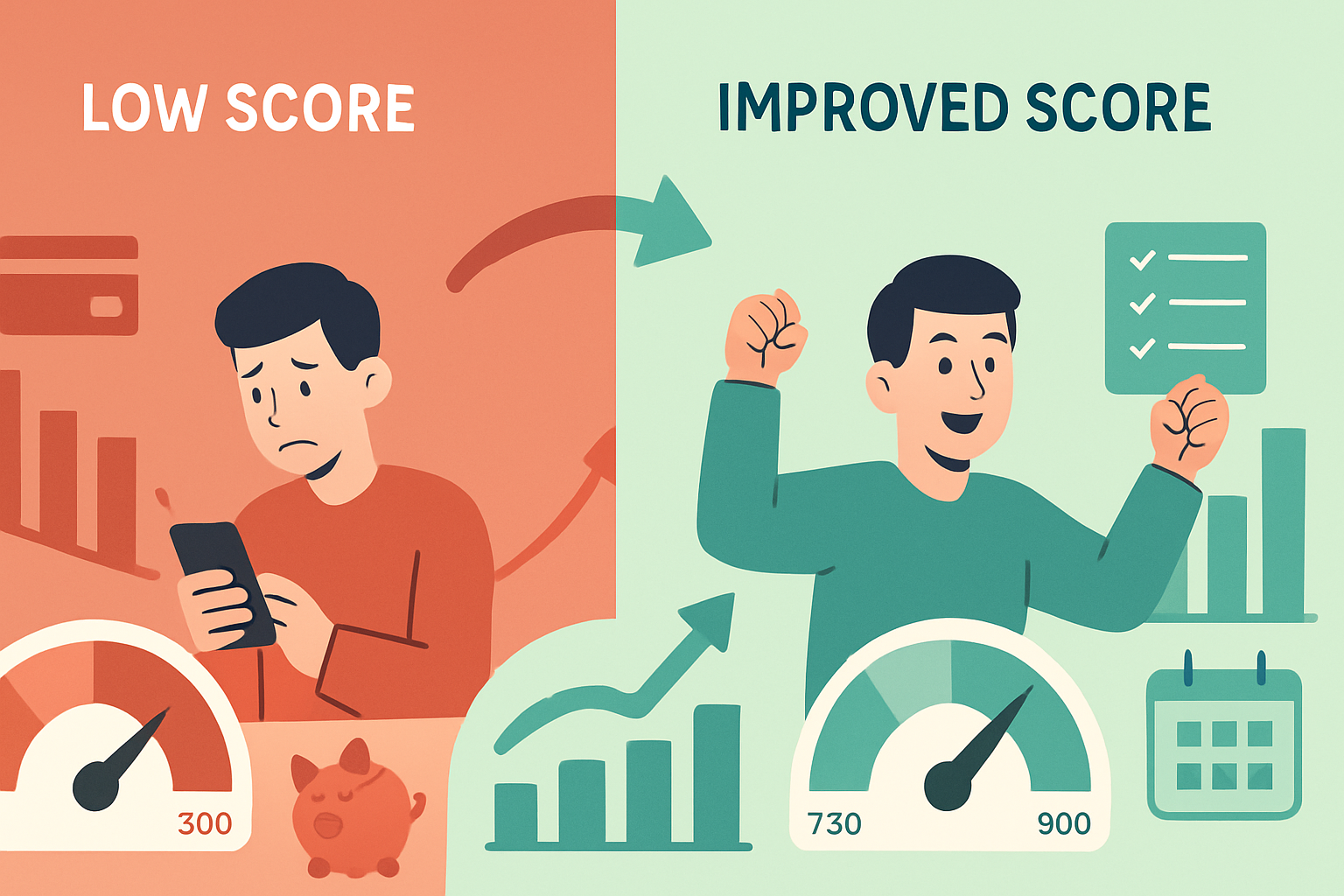When it comes to financial planning or borrowing, one of the common terms people come across is credit score. In India, CIBIL Score is also used frequently, interchangeably with credit score. Though both are mostly related, there are minor differences between the two. Understanding the difference is crucial for anyone looking to apply for a loan, credit card, or even maintain healthy financial habits.
Here in this blog, we will break down the difference between CIBIL Score and Credit Score in India. Also, it will highlight their importance and make you understand how each of them impacts your financial journey.
What is a credit score in India?
A credit score in India is a three-digit number that reflects your overall creditworthiness. The credit score is completely based on your borrowing and repayment history, as reported by banks and financial institutions to credit bureaus. A credit score typically ranges between 300 and 900, with a higher score indicating better credit behavior.
Credit Range
- 300-599: Poor
- 600-749: Average
- 750-900: Excellent
Who calculates credit scores?
Several bureaus in India calculate credit scores, including TransUnion CIBIL, Experian, Equifax, and CRIF High Mark. Each bureau has its own method of calculating scores, but all are recognized by the RBI.
A strong credit score in India increases your chances of getting loans approved quickly and at lower interest rates.
What is a CIBIL Score?
The CIBIL score is the most widely used credit score in India. It is calculated by TransUnion CIBIL, which was the first credit bureau licensed by the RBI. Because of its popularity and widespread use by lenders, the term “CIBIL score” has almost become synonymous with credit score. The CIBIL Score ranges between 300 and 900.
For calculation, it considers repayment history, number of credit accounts, credit utilization ratio, and the length of your credit history. More than 90% of Indian banks and NBFCs check the CIBIL score before approving loans or credit cards.
Why does it matter?
Since CIBIL is the most widely established bureau in India, its score is the first preference for most lenders when they assess borrowers. This is the main reason why many people think of CIBIL Score as the only credit score.
Key difference between CIBIL Score and Credit Score in India
| Aspect | CIBIL Score | Credit Score |
| Meaning | Score given by TransUnion CIBIL | General term for scores from all bureaus |
| Provider | Only by Transunion CIBIL | CIBIL, Experian, Equifax, CRIF High Mark |
| Range | 300-900 | 300-900 (Varies by Bureau) |
| Usage | Preferred by most Indian Lenders | Valid but less commonly referred to |
| Perception | Often treated as a default score | Broader Category, including all bureaus |
Why is the difference between CIBIL Score and Credit Score in India important?
Many people confuse CIBIL with Credit Score. But understanding the difference will help you in several ways,
Better awareness of your options:
Calculations differ from bureau to bureau. For example, the score given by one bureau may not be the same as that provided by another bureau. It may be slightly different, can be higher or lower.
Accurate loan applications:
Lenders may check your report from various bureaus. Being aware of the difference helps you track multiple reports more effectively and avoid surprises.
Improved Financial Planning:
You can assess your credit health by checking reports from multiple bureaus, not just CIBIL.
Avoid misunderstandings:
Many people get scared if their CIBIL Score is slightly lower without even checking their score from other bureaus. So understanding the broader system prevents unnecessary tension.
How do Credit Score and CIBIL Score impact borrowing?
In India, whether it’s a credit score or a CIBIL score, both have a direct impact on your financial opportunities.
- For approving loans, lenders rely on these scores to decide whether you are a genuine borrower.
- A high score attracts low interest rates, and a low score may lead to a higher interest rate.
- Banks often offer premium credit cards to only those with excellent credit scores.
- A better score can help you qualify for higher credit limits.
Tips to maintain a good credit score across bureaus
Primarily, the credit score depends on your financial behaviour, no matter which bureau calculates it. Here are some tips through which you can maintain a good score consistently;
Pay on time:
Because a single missed payment can hurt your credit score
Keep credit utilization low:
Try using less than 30% of your total credit card limit.
Avoid multiple applications:
Applying for too many loans and credit cards in a short period of time can create a negative impact
Maintain a mix of credit:
Keep a balance of secured and unsecured loans; it is better than relying only on one type.
Review credit reports regularly:
Check reports from all bureaus to identify errors and inaccuracies quickly.
Conclusion
The difference between the credit score and the CIBIL Score in India lies in their scope and also the provider. Both serve the same purpose: accessing your creditworthiness. Comparing both of them, CIBIL is more widely accepted in India due to its history and the trust gained among lenders.
Understanding the difference is not only a matter of terminology. It helps in making smarter decisions, tracking your credit health more effectively, and avoiding confusion when lenders use different reports. Basically, whether it’s a credit score or a CIBIL score, the best way to benefit from them is to build strong financial health. By repaying on time, borrowing responsibly, and monitoring your reports, you can establish a healthy financial future.



